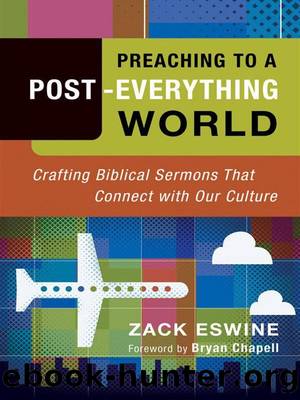Preaching to a Post-Everything World: Crafting Biblical Sermons That Connect with Our Culture by Zack Eswine

Author:Zack Eswine [Eswine, Zack]
Language: eng
Format: mobi
Publisher: Baker Publishing Group
Published: 2008-04-01T00:00:00+00:00
The Simplistic Preacher
All they had ever known in one series of haunted moments was gone. The tearing of clothes followed. Weakness in the legs conspired with nausea and pulled the body off balance. Emotional shock choked out breath and voice. Then his skin joined in the nightmare. Disease and open soars inflicted the kind of physical agony that takes no Sabbath rest. As I think of Job’s story, I can’t help but imagine what it would be like to preach for him and his wife following the disaster.
Job’s friends attempt by personal oration to bring God’s truth to bear on his tragic situation. All they need do is call Job to discern the two paths, dismiss the bad one, and follow the good one. Then everything will work out, right? After all, Job’s friends are not hypocrites or heretics. Each one of them “believes firmly in the one God.”9 Yet God says that the two-path messages of these theologically astute friends express folly (Job 42:7–8).
Job’s friends bring us back to simplism. Simplism can take place when naïveté and arrogance unite in those who try to truthfully explain life. The simplistic preacher uses right theology wrongly. Such preachers offer trite solutions to complex matters. “The basic error of Job’s friends,” Derek Kidner observes, “is that they overestimate their grasp of truth, misapply the truth they know, and close their minds to any facts that contradict what they assume.”10
The simplistic preacher sometimes resembles the enchanter by his use of the Bible. He acts as if when one merely quotes the right verses the good life will follow. For example, Job’s friends seem warranted for their assessment of Job’s condition. The Proverbs do observe that “disaster pursues sinners, but the righteous are rewarded with good” (13:21). What else is there then but that Job needs to repent?
The problem is that Ecclesiastes concurrently points out that “there is a righteous man who perishes in his righteousness, and there is a wicked man who prolongs his life in his evildoing” (Eccles. 7:15). Life is not so simple. Job is not suffering because he is on the wrong path. The wise recognize that sometimes the right path is fraught with difficulty. There are unseen realities, such as God’s conversation with Satan that we can neither hear nor explain. This is why God graciously provides wisdom. Folly is unwise; simplism is trite. A wisdom kind of sermon challenges both and clarifies reality.
Simplistic preaching is rife with folly. It is our bane in a post-everything world. If folly acknowledges God at all (Ps. 14:1), it will curse God when bad things happen (Job 2:9–10). It despises God’s instruction about life (Prov. 1:7). The foolish are always talking; they do not listen. Even their questions are veiled comments and opinions (Prov. 23:9). They assume they know the answers before they have understood the questions (Prov. 18:13). They use speech not to learn but to give vent to their own opinions (Prov. 18:2). The foolish are unteachable. They will not admit that they need correction, nor will they submit to it when it is offered (Prov.
Download
This site does not store any files on its server. We only index and link to content provided by other sites. Please contact the content providers to delete copyright contents if any and email us, we'll remove relevant links or contents immediately.
| Adult Ministry | Children's Ministry |
| Counseling & Recovery | Discipleship |
| Evangelism | Missions & Missionary Work |
| Preaching | Sermons |
| Youth Ministry |
The Rape Of Nanking by Iris Chang(2326)
The Secret Power of Speaking God's Word by Joyce Meyer(2253)
Chosen by God by R. C. Sproul(1761)
Crash the Chatterbox by Steven Furtick(1657)
Knowing God by J.I. Packer(1432)
Habits of Grace by David Mathis(1423)
How To Be Born Again by Billy Graham(1404)
A Prophet with Honor by William C. Martin(1375)
Peace with God by Billy Graham(1319)
God's Smuggler by Brother Andrew(1219)
Confronting Christianity by Rebecca McLaughlin(1193)
Whisper by Mark Batterson(1157)
Angel Dreams by Virtue Doreen Virtue Melissa(1140)
Missionaries by Norman Lewis(1137)
The Truth War by John MacArthur(1106)
The School of Biblical Evangelism by Ray Comfort(1100)
The Poems of Rowan Williams by Rowan Williams(1072)
Do Greater Things by Robby Dawkins(1047)
Eucharistic Miracles by Cruz Joan Carroll(1017)
